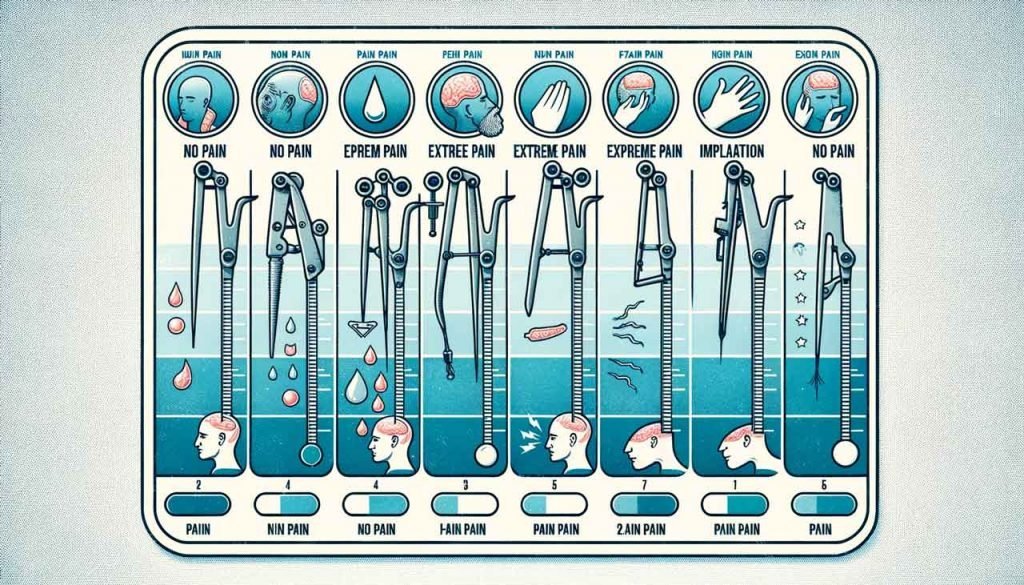So, you've been toying with the idea of getting that luscious mane back, but there's a nagging question: "How painful is hair transplant surgery?" 🤔 First off, kudos for considering a bold step! Now, let's spill the beans. Imagine that fleeting sting when you accidentally pluck a hair while brushing. That's the vibe. Sure, there's a bit of discomfort (hey, no pain, no gain, right?), but think of it as the brief pinch before the magic happens. And once the show's over? A smidge of tenderness, nothing a cozy blanket and a mild painkiller can't fix. Dive in with us, and let's journey through the real deal of what to expect sans the hype. Ready to swap those hair transplant jitters for some head-turning locks? Let's redefine your hair story together! 🚀🌟
Table of Contents

Understanding Hair Transplant Procedures
To understand hair transplant procedures, you must familiarize yourself with the two main types: FUT (Follicular Unit Transplantation) and FUE (Follicular Unit Extraction). FUT involves removing a strip of hair follicles, dividing them into grafts, and implanting them into the balding area. It's a bit more invasive and can leave a scar. On the other hand, FUE extracts individual follicles and inserts them into the affected area. It's less invasive, heals faster, and leaves little to no scarring. Remember, you're not alone in this. Many others have walked this path, and it's okay to ask questions, seek advice, or share your concerns. We're all part of a community seeking the same goal: to regain confidence through a fuller, healthier head of hair.

Post-Surgery Pain and Recovery
Often, you'll find that the aftermath of the surgery involves some tenderness and soreness in your scalp once the anesthesia wears off. This discomfort is a typical part of the healing process. Redness and slight swelling are common, but don't worry; you're not alone; everyone who goes through this procedure shares this experience. Mild painkillers can help manage the initial discomfort. As part of our community, you'll have access to guidance and support, ensuring your recovery goes as smoothly as possible. Over the next few days, the soreness will subside. Remember, it's important to stick to your post-surgery guidance, taking special care when washing your hair or doing physical activities. We're here with you every step of the way.
Promoting Hair Growth With Supplements
As you're moving past the initial recovery phase, you might want to consider incorporating certain supplements into your diet to boost hair growth. Vitamins like biotin and minerals such as zinc can become your new best friends. They're known to promote hair growth and could help your new hair become stronger and healthier. It's not just about what you put in your body; omega-3 fatty acids in fish oil can also improve hair health.
Don't overlook the importance of a balanced diet of fruits and veggies. Remember, we're all in this together. If you're unsure about what supplements to take, don't hesitate to consult with a doctor or nutritionist. They can guide you to make the best choices for your unique situation.
Utilizing Minoxidil for Hair Loss
You're likely familiar with Minoxidil, a topical medication commonly used to combat hair loss. As part of our hair restoration family, you're not alone in your quest for a fuller, healthier head of hair. Minoxidil dilates blood vessels, improving blood flow to your hair follicles. This stimulates growth and could be the solution you've been searching for.
Bear in mind patience is key. It might take a few months before you notice significant changes. You might even experience increased hair shedding initially - but don't panic. This is simply a sign that older hairs are making way for new growth. Side effects such as scalp irritation can occur, but with consistent use and a supportive community like ours, you're on the right path to reclaiming your hair.
Cost Considerations for Hair Transplants
The cost of a hair transplant can be a major consideration for you, and it's important to factor in all associated expenses. Now, let's break down the costs so you can understand what you're investing in.
Here's a simple table to help you visualize:
| Expense | Approximate Cost |
|---|---|
| Doctor's fee | $2000-$4000 |
| Medications and Supplies | $200-$300 |
| Procedure Room cost | $1000-$2000 |
| Hair Grafts | $3-$10 per graft |
| Follow-up care | $100-$200 |
Frequently Asked Questions
What Are Some Alternative Treatments to Hair Transplant Surgery for Hair Loss?
You're not alone in your hair loss journey. Alternatives to hair transplant surgery include topical treatments like Minoxidil, oral medications such as Finasteride, or natural methods like biotin supplements and a healthy diet.
Are There Any Psychological Impacts of Undergoing a Hair Transplant Surgery?
Yes, undergoing hair transplant surgery can impact you psychologically. It might boost your self-esteem, but it's also normal to feel stress or anxiety. Remember, it's okay to seek support during this transformative journey.
Does the Age or Gender of the Patient Influence the Success Rate of Hair Transplant Surgeries?
Age or gender doesn't directly influence the success of hair transplants. What's crucial is your overall health, hair quality, and following aftercare instructions. Everyone's unique, so your results will be too.
How Does Smoking or Alcohol Consumption Impact the Effectiveness of Hair Transplant Surgeries or Recovery?
You'd think smoking and alcohol wouldn't impact hair transplants, right? Wrong. They can slow healing, increase infection risk, and even affect graft survival. It's best to avoid them before and after surgery.
Are There Special Precautions to Be Taken for Patients With Certain Medical Conditions Like Diabetes or Hypertension Before Undergoing Hair Transplant Surgeries?
If you're managing conditions like diabetes or hypertension, discussing this with your surgeon is crucial. They'll guide you on specific precautions to ensure a safe, successful hair transplant experience.
References:
Comparison of postoperative pain according to the harvesting method used in hair restorative surgery
Links:
The Guide to Hair Transplant: Procedure, Recovery, and Results

